As a project-based learning (PBL) school, we focus on the whole child and value not only academic success but also social-emotional growth. We bring learning to life in the real world.
The Colorado SKIES Academy team provides a rich learning experience that includes the following:
- STEAM programming with a hands-on aerospace and aviation focus.
- Authentic, rigorous projects.
- Partnership with members of the aviation and aerospace community.
- A wide variety of engaging electives.
- Award-winning learning spaces.
- Partnership with Wings over the Rockies Air & Space Museum.
- An inspiring location at the Centennial Airport and the campus of the Boeing Blue Sky Exploration of Flight Center.
Project-Based Learning
At Colorado SKIES Academy, PBL is at the core of what we do. This revolutionary model helps learners understand the valuable collaborative, academic, and problem-solving skills our global economy will demand from them. Through the PBL method, learners tackle deeply engaging projects about real-world issues that require critical thought, inquiry, and synthesis then culminate in regular Presentations of Learning (POLs) to their peers, facilitators, community members, and parents.
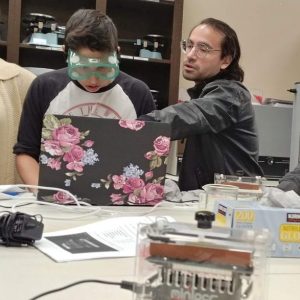 The PBL model requires learners to research, collaborate, and carefully weigh information and evidence in a nuanced problem-solving environment. It teaches learners to accept feedback, create solutions, and present their findings in a high-performance context, preparing them for the rigors of the 21st-century economy and the challenges of a global world. It is, in a word, transformative.
The PBL model requires learners to research, collaborate, and carefully weigh information and evidence in a nuanced problem-solving environment. It teaches learners to accept feedback, create solutions, and present their findings in a high-performance context, preparing them for the rigors of the 21st-century economy and the challenges of a global world. It is, in a word, transformative.
According to the Buck Institute for Education:
- PBL makes school more engaging for learners. Today’s learners, more than ever, often find school to be boring and meaningless. In PBL, learners are active, not passive; a project engages their hearts and minds, and provides real-world relevance for learning.
- PBL improves learning. After completing a project, learners understand content more deeply, remember what they learn, and retain it longer than is often the case with traditional instruction. Because of this, learners who gain knowledge through PBL are better able to apply what they know and can do in new situations.
- PBL builds success skills for college, career, and life. In the 21st-century workplace and in college, success requires more than basic knowledge and skills. In a project, learners take initiative and responsibility, build their confidence, solve problems, work in teams, communicate ideas, and manage themselves more effectively.
- PBL helps address standards. The Common Core and other present-day standards emphasize real-world application of knowledge and skills and the development of success skills, such as critical thinking/problem-solving, collaboration, communication in a variety of media, and speaking and presentation skills. PBL is an effective way to meet these goals.
- PBL provides opportunities for learners to use technology. Learners are familiar with and enjoy using a variety of tech tools that are a perfect fit with PBL. With technology, facilitators and learners not only find resources and information and create products but also collaborate more effectively and connect with experts, partners, and audiences around the world.
- PBL makes teaching more enjoyable and rewarding. Projects allow facilitators to work closely with active, engaged learners doing high-quality, meaningful work, and, in many cases, to rediscover the joy of learning alongside their learners.
- PBL connects learners and schools with communities and the real world. Projects provide learners with empowering opportunities to make a difference, by solving real problems and addressing real issues. Learners discover how to interact with adults and organizations, are exposed to workplaces, and develop career interests. Parents and community members can be involved in projects.
Key Focus Areas
In addition to core academic education, the Colorado SKIES Academy curriculum focuses specifically on preparing learners for promising aerospace careers.
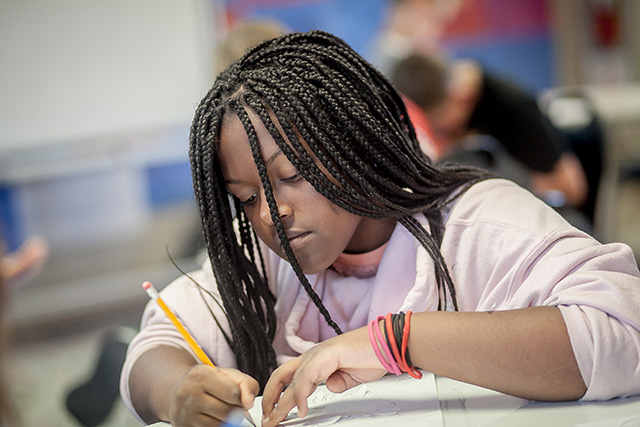 Aero/Gliders: Learners use the engineering design process to fabricate and launch their own gliders through a design challenge; interact with scale gliders and glider pilots to support their understanding of the parts of a glider, flight controls, and aerodynamics; and ultimately fly in a glider in partnership with a local soaring academy.
Aero/Gliders: Learners use the engineering design process to fabricate and launch their own gliders through a design challenge; interact with scale gliders and glider pilots to support their understanding of the parts of a glider, flight controls, and aerodynamics; and ultimately fly in a glider in partnership with a local soaring academy.
DreamUp to Space: Learners develop and use the engineering design process to design, test, and submit their own proposal for an experiment that can be run on the International Space Station.
MiniPCR/Genes in Space: Genes in Space™ is a global science competition inviting students to propose pioneering DNA experiments that address a space exploration challenge.
Arduino and sensor data collection and analysis through Because Learning: Through this project, learners develop skills related to electronics, engineering, data collection and analysis, mathematics, coding and innovation.
SOFIA Project: Learners do self-driven and guided exploration to define light, understand how it works, and research technologies that use light to expand our understanding of our universe.
Unmanned Aerial Vehicle Challenge/Drones: Learners engage in the engineering design process to build and operate UAVs in grade-appropriate design challenges and competitions.
Rockets: Learners apply the design process to build and launch rockets (including collecting, recording, and interpreting data), understand laws of physics and, if applicable, chemical reactions.
Common Core Standards
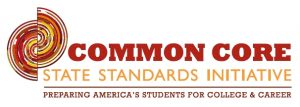 In 2010, Colorado and more than 40 other states adopted the same standards for English language arts and mathematics. These standards are called the Common Core State Standards (CCSS). Having the same standards helps all learners experience a consistent education. Facilitators, parents, and education experts designed the CCSS to prepare learners for success in college and the workplace.
In 2010, Colorado and more than 40 other states adopted the same standards for English language arts and mathematics. These standards are called the Common Core State Standards (CCSS). Having the same standards helps all learners experience a consistent education. Facilitators, parents, and education experts designed the CCSS to prepare learners for success in college and the workplace.
Colorado SKIES Academy uses Common Core State Standards in accordance with Colorado Department of Education requirements. We also strive to create learners who are critical thinkers preparing themselves to be leaders who embody skills including the following:
- Critical thinking
- Problem-solving
- Collaboration
- Communication
- Creativity
- Innovation
- Global awareness
- Media fluency
- Analytical skills
- Entrepreneurialism
- Curiosity
- Effective speaking
- Information literacy
- Self-direction
- Adaptability
Deeper Learning
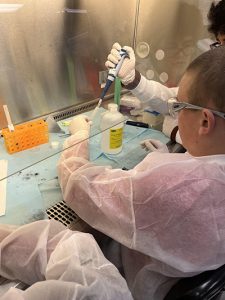 With deeper learning, learners apply what they have learned in one subject area to newly encountered situations in another. They can see how their classwork relates to real life. They are gaining indispensable knowledge, skills and beliefs, including:
With deeper learning, learners apply what they have learned in one subject area to newly encountered situations in another. They can see how their classwork relates to real life. They are gaining indispensable knowledge, skills and beliefs, including:
Mastery of Core Academic Content: Learners build their academic foundation in subjects like reading, writing, math and science. They understand key principles and procedures, recall facts, use the correct language and draw on their knowledge to complete new tasks.
Critical Thinking and Problem-Solving: Learners think critically, analytically and creatively. They can design their own solutions to complex problems.
Collaboration: Collaborative learners work well in teams. They communicate and understand multiple points of view, and they know how to cooperate to achieve a shared goal.
Effective Communication: Learners communicate effectively in writing and in oral presentations. They structure information in meaningful ways, listen to and give feedback, and construct messages for particular audiences.
Self-Directed Learning: Learners develop an ability to direct their own learning. They set goals, monitor their own progress, and reflect on their own strengths and areas for improvement. They learn to see setbacks as opportunities for feedback and growth. Learners who learn through self-direction are more adaptive than their peers.
A Growth Mindset: Learners with a growth mindset have a strong belief in themselves. They trust their own abilities and believe their hard work will pay off, so they persist to overcome obstacles. They also learn from and support each other. They see the relevance of their schoolwork to the real world and their own future success.
Social-Emotional Learning
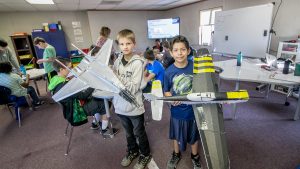 At Colorado SKIES Academy, we maintain a unique emphasis on using methods that foster our learners’ social-emotional development and personal strengths. We are committed to ensuring our students learn to lead, be self-directed, and develop their emotional IQ in a way that inspires creativity and engagement in their coursework. We believe it’s vital to help learners develop the skills of social awareness, self-management, regulation of emotions, and self-awareness early so they can begin to weave these abilities through every facet of their lives.
At Colorado SKIES Academy, we maintain a unique emphasis on using methods that foster our learners’ social-emotional development and personal strengths. We are committed to ensuring our students learn to lead, be self-directed, and develop their emotional IQ in a way that inspires creativity and engagement in their coursework. We believe it’s vital to help learners develop the skills of social awareness, self-management, regulation of emotions, and self-awareness early so they can begin to weave these abilities through every facet of their lives.
As an integral part of our approach to teaching, the implementation and evaluation of social-emotional learning (SEL) principles are inseparable from our project-based learning model, which requires learners to research, collaborate, and carefully weigh information and evidence in a nuanced problem-solving context and teaches them to accept feedback, create solutions, and present their findings in a high-performance context.
To accomplish this vital mission, we measure and report SEL progress as part of every project, individualized learning plan goal, and Report of Progress. We have also developed SEL and academic rigor rubrics that add a well-balanced approach to academics and reflective practice for facilitators, learners, parents, and administrators.
Other elements of our SEL implementation, practice, and assessment include the following:
- Learner Led Conferences (LLCs)
- Presentations of Learning (POLs)
- Passion Projects
- Individualized Learning Plans (ILPs)
- Advisory Program
- Learner-driven ambassador groups
- Morning Meetings
- Restorative approaches to discipline
Presentations of Learning
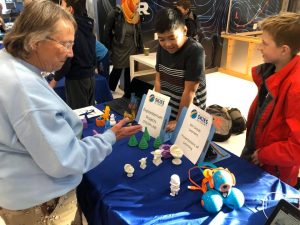
At Colorado SKIES Academy, the project-based learning (PBL) emphasis is on the process rather than the product. As part of the PBL process, learners create and share Presentations of Learning (POL). The POL is an opportunity for learners to showcase and reflect on their own achievement and growth through the completion of the project. POLs are also an opportunity for learners to exhibit their own creativity and design thinking, present the outcome of their efforts, and celebrate their academic successes.
In addition, a POL makes learning during the PBL process visible and exemplifies evidence of authenticity. During the PBL process, learners engage in continuous feedback with teammates, facilitators, mentors, coaches, and others involved in the project. Presenting an entire process at the end that entails a final product, idea, initiatives, and any other relevant artifacts and processes created during the process is a great way to celebrate success as well as receive feedback.
Student Support
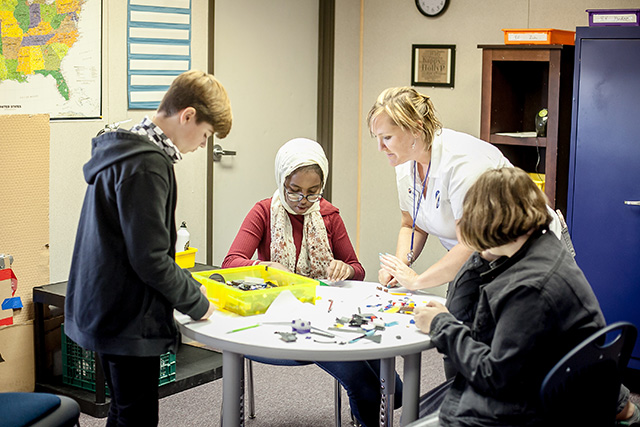 Colorado SKIES Academy embraces a paradigm for education that believes in the success of ALL learners. This includes a belief that every learner has strengths and also areas of challenge. Our flexible learning environment allows facilitators to modify and personalize the learning experience.
Colorado SKIES Academy embraces a paradigm for education that believes in the success of ALL learners. This includes a belief that every learner has strengths and also areas of challenge. Our flexible learning environment allows facilitators to modify and personalize the learning experience.
Our classrooms are inclusive. All learners work and learn in the same classroom. Everyone’s strengths are celebrated and challenges are addressed. Accommodations are made as needed to ensure success. Learning experiences are collaborative and, through innovative experiences, learners discover and embrace the idea that differences contribute to our common humanity. This inclusive environment creates opportunities for all learners to develop empathy and become thoughtful and caring community members in all areas of life.
Do you feel your child is having academic or behavioral challenges?
If your child is having academic or behavioral challenges, please contact their facilitator to discuss your concerns. Many times, the facilitator can make small adjustments and modifications that will get your child on the path to success. If you continue to have concerns after meeting with your child’s facilitator, you or the facilitator may request a student study team meeting. At this meeting a team, including you, will brainstorm additional strategies to help your child grow academically or behaviorally.
If your child is new to Colorado SKIES Academy and has a current IEP or 504 plan, please immediately contact the student support coordinator. An IEP meeting will be held to review current goals and to ensure services are in place to support your learner.
Discipline Philosophy
Colorado SKIES Academy’s approach to discipline centers on restorative practices and Love and Logic, a straightforward parenting and teaching philosophy that holds that children learn the best lessons when they’re given a task, allowed to make their own choices — which may involve failing — when the cost of failure is still small. Those failures must be met with love and empathy from their parents and facilitators. The Love and Logic methodology allows us to embrace each learner’s uniqueness while modeling and expecting appropriate behavior. We also provide regular opportunities for our parents to learn more about how to implement Love and Logic techniques at home. For more information on Love and Logic, click here.
Our restorative approach to learner discipline views relationships as central to a healthy environment for our learners. We strive to create a community of shared values where learner participation is required, not optional. Our facilitators and administrators model these values. The goal of our restorative justice philosophy is to help learners find solutions to behavioral or social issues through open dialogue rather than simply handing down an arbitrary punishment.
At Colorado SKIES Academy, we adhere to the following community expectations for school behavior:
- I will do nothing to harm myself or others.
- I am responsible for my behavior.
- We are each other’s keeper.
- I take pride in myself and my work.
- I will leave it better than I found it.
- We will have fun!
Our disciplinary philosophy is firmly rooted in our commitment to facilitating our learners’ social-emotional growth. We know that every learner is different, as are the challenges they face. We believe it is part of our job as educators to help our students learn self-direction and discipline. To that end, we include an assessment of social-emotional skills in our learners’ Individualized Learning Plans, Learner-Led Conferences, and Reports of Progress.
